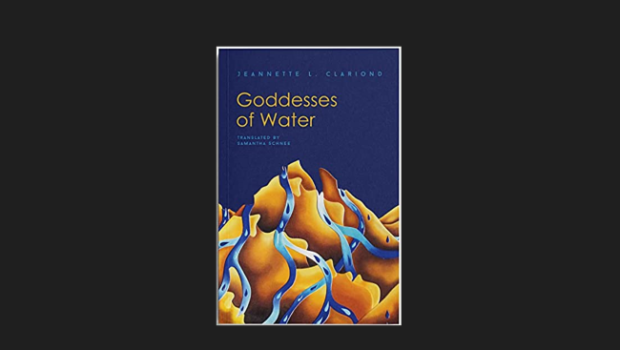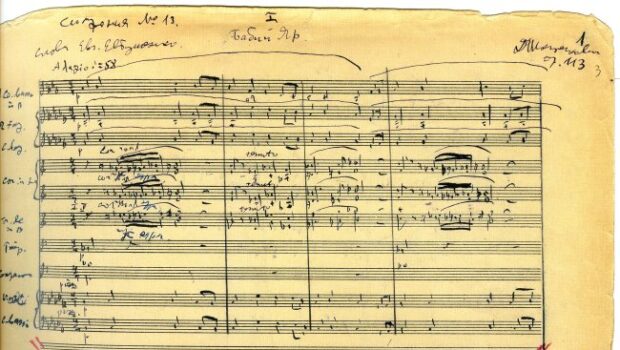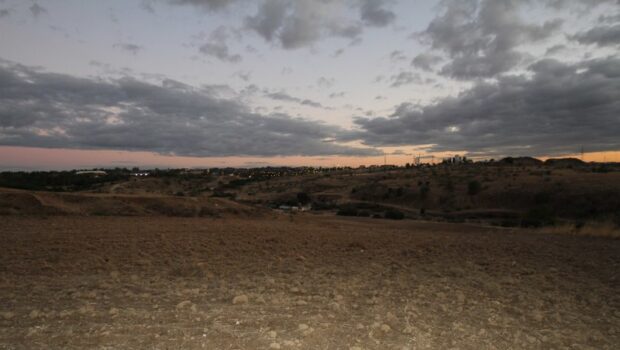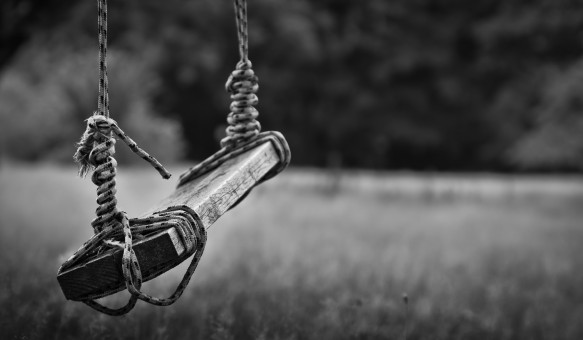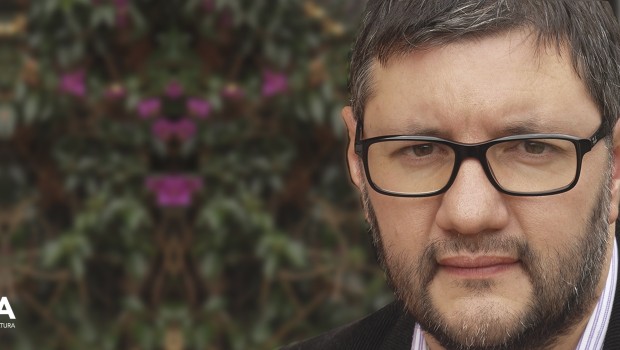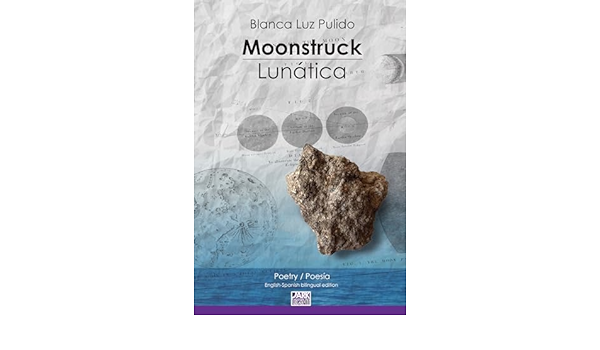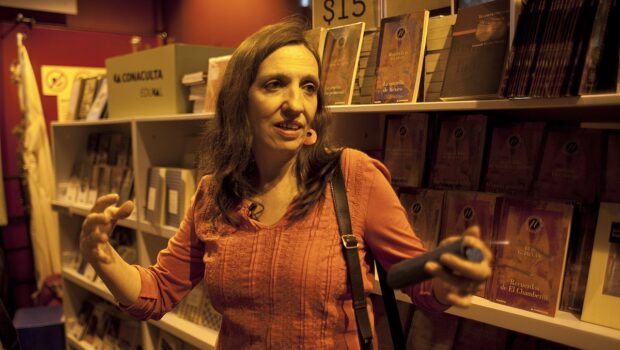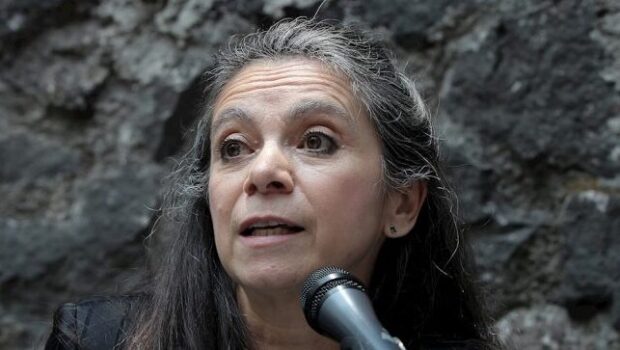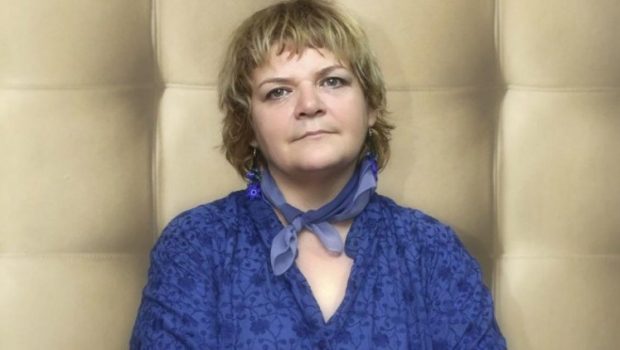Two Excerpts from Goddesses of Water
Dos extractos de Las diosas del agua
Jeannette L. Clariond
from part 3: 52 fragments Translated by Samantha Schnee
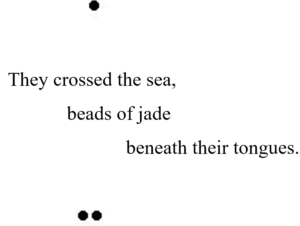
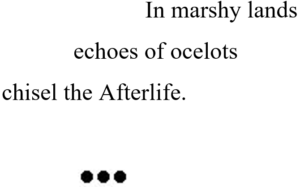
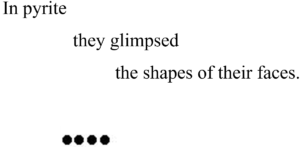
………………………………….What foliage, what pure water
………………………stirred the
confusion of oblivion?
![]()
The phases of the Moon
…………………………..fell
………………………………broken into pieces.
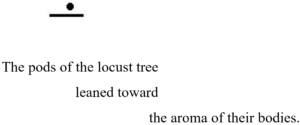
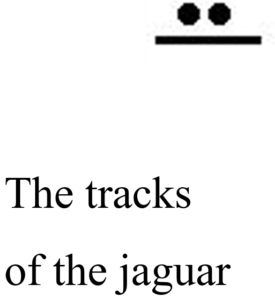
…………………………….splattered the seeds.
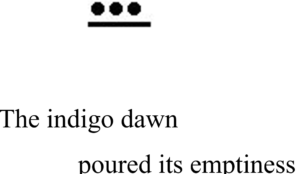
…………………on the eyelids of the sea.
![]()
…………………………………….A brief commotion of birds
………………………arose, auguring
..the coming of winter.
![]()
…………………………………………………………………Flaming flowers
……………………………………………………………….filled their ewers
……………………………………………………………………with heaven.
![]()
………………………………………………………Their mouths of loose
……………………………………………………………bound language
……………………………………………………to their hands of amaranth.

…………………………………………………………….Serpents’ tongues,
……………………………………………………………………the rain
…………………………………………………………….wooed the mud.

In the lake the goose
…………………….deciphers
………………………………..its destiny.

…………………………………Like a lapse in oblivion
……………………..the feathers scattered
…..over the breasts of the Moon.
![]()
…………………..Portals to the estuary,
——————–the goddesses
—————-offered their tona to the Sun.

……………………….The silver thread of the snail
…………….ploughed
………………………..the seam of their song.

…………………..It was the year 13 Pedernal.
…………………………………………In the morning the teponaztles
accompanied Axayacatzin’s songs.
![]()
The flames
………………………………………………..–quetzal wings–
…………………………………..multiplied the god’s faces.

And the wind began to roar
…………….like a hollow elm,
………………………..and that day silence sundered the Earth.
*****
from PART 5: POSTCANTO
My body falls into the water
My body has been violated, my remains in a plastic bag,
tossed into a swamp.
I lie at the bottom in the mire.
I will remain in the mud
days, nights, moon-cycles, dark depths.
The dismembered corpses of other women fall, too.
The Sun strikes its blade between the folds of a pain
coming towards me.
Must agony recur?
O, goddesses, your bodies decompose in the salt.
I bury my hands in the earth, yet they come up empty.
Blackened, my nails keep on digging
in this wasteland repudiated by graveyards.
The veiled idea of death makes my feet throb.
The redness forms a sediment in the depths.
Let’s rush to raise a song for these dead women
for whom no one will be held accountable.
Blind eyes of stone, blind hands, have pity!
Mother of all ages, you do not come to their rescue, you
are not here, to draw their injured voices from
the freezing currents.
If only I could reach their faces, peer into those holes…
but no.
The dominion of your name has been raised on high.
And the doors have been shut fast.
Such are the morals of our civilized world:
each day shall be crueler than the last.
These bundles tossed from mountaintops,
dragged along by rivers, embody my pain.
Water, bird’s breath: three naked girls next to the stream,
their clothes scattered on barbed wire.
Is the victim’s stifled, silent spirit naught but milk?
Say what suffering ears would not hear.
Speak your lament for the death of the hour
that has ceased to give birth.
Tell how your breast embraces hopelessness,
that worn link the final offspring of your light.
The hour takes not measure of the soul,
yet time is measured in blood.
The silence of these bodies resounds
throughout this barren land!
*These poems belong to the book Goddesses of Water, translated by Samantha Schnee (World Poetry Books, 2022)
 Jeannette L. Clariond is a Mexican poet and translator. Her books include Mujer dando la espalda, Desierta memoria (winner of the Efraín Huerta National Poetry Prize), Todo antes de la noche (winner of the Gonzalo Rojas National Poetry Prize), Leve sangre (finalist for the Cope Prize in Peru), and Ante un cuerpo desnudo (winner of the second San Juan de la Cruz International Poetry Prize), among others. She was just recognized with the Enriqueta Ochoa Award 2020. Her Twitter is @JLClariond
Jeannette L. Clariond is a Mexican poet and translator. Her books include Mujer dando la espalda, Desierta memoria (winner of the Efraín Huerta National Poetry Prize), Todo antes de la noche (winner of the Gonzalo Rojas National Poetry Prize), Leve sangre (finalist for the Cope Prize in Peru), and Ante un cuerpo desnudo (winner of the second San Juan de la Cruz International Poetry Prize), among others. She was just recognized with the Enriqueta Ochoa Award 2020. Her Twitter is @JLClariond
©Literal Publishing. Queda prohibida la reproducción total o parcial de esta publicación. Toda forma de utilización no autorizada será perseguida con lo establecido en la ley federal del derecho de autor.
Las opiniones expresadas por nuestros colaboradores y columnistas son responsabilidad de sus autores y no reflejan necesariamente los puntos de vista de esta revista ni de sus editores, aunque sí refrendamos y respaldamos su derecho a expresarlas en toda su pluralidad. / Our contributors and columnists are solely responsible for the opinions expressed here, which do not necessarily reflect the point of view of this magazine or its editors. However, we do reaffirm and support their right to voice said opinions with full plurality.
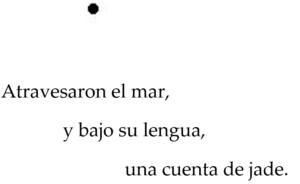
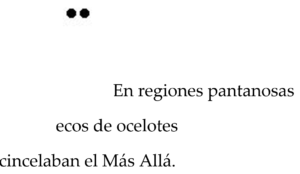
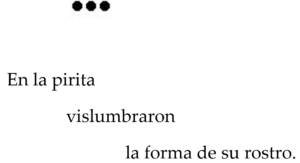
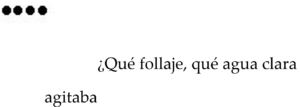
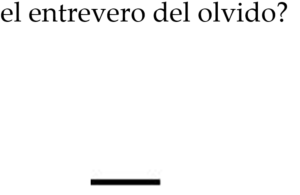
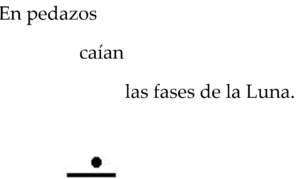

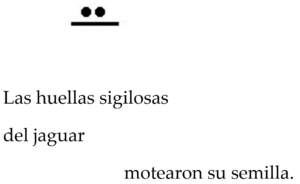
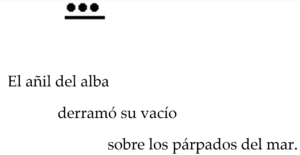
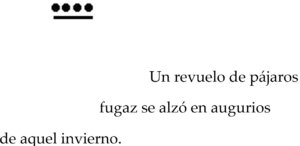
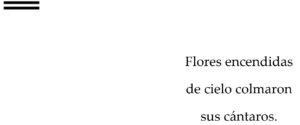

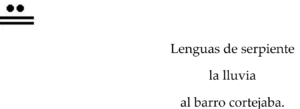
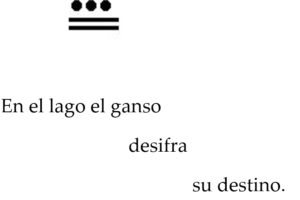
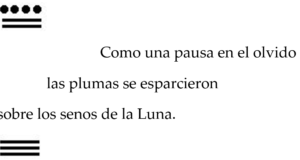
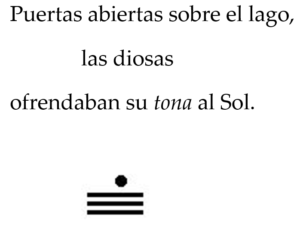
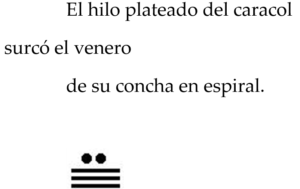
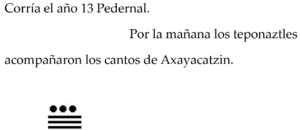
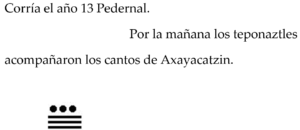
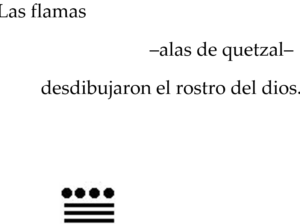

*****
de la PARTE 5: POSTCANTO
Mi cuerpo cae en el agua.
Mi cuerpo ha sido violado, mis restos, en bolsa de plástico.
arrojados a la ciénega.
Yazgo en el fondo del lodazal.
Permaneceré en el fango
días, noches, lunas, oscuras profundidades.
Caen, desmembrados, los cuerpos de otras mujeres.
El Sol clava su filo entre los pliegues de un dolor
que viene hacia mí.
¿Es que toda agonía debe repetirse?
Oh, diosas, vuestros cuerpos se desintegran en la sal.
Hundo mis manos en la tierra, salen vacías.
Ennegrecidas mis uñas, siguen cavando
en el baldío que repudian los cementerios.
Pulsan mis pies la velada materialidad de la muerte.
El rojo se asienta en lo hondo.
Precipitémonos a elevar el canto por estas mujeres muertas
de las que nadie dará cuenta.
Ciegos ojos de piedra, ciegas manos, ¡piedad!
Madre de todas las edades, tú no vienes a rescatarlas, tú
no estás aquí, en las gélidas corrientes replegando
las voces agredidas.
Si yo pudiera alcanzar su rostro, mirarme en esos huesos…
pero no.
El reino de tu nombre está en lo alto.
Y las puertas han sido clausuradas.
Ésta la moral de nuestro mundo civilizado:
cada día ha de ser más cruel.
Esos bultos despeñados de los montes,
arrastrados por el río, son mi dolor a secas.
Agua, soplo del ave: tres niñas desnudas junto al arroyo,
su ropa dispersa en la alambrada.
¿Es leche este espíritu ofendido, acallado, silenciado?
Di lo que los oídos sufrientes no quieren aceptar.
Di tu lamento por la expiración de aquella hora
que no alumbra más.
Di que tu regazo acoge la oscura queja,
el eslabón raído, el último linaje de tu luz.
Dime que la hora no mide el alma,
sino el tiempo de la sangre.
El silencio de estos cuerpos resuena
desde esta tierra desollada.
El tiempo también sangra.
*Estos poemas pertenecen a Las diosas del agua (World Poetry Books, 2022)
 Jeannette L. Clariond es poeta y traductora. Ha colaborado en diversas revistas y periódicos nacionales y extranjeros como ABC, El País, La Jornada Semanal, La Vanguardia, Literal y Letras Libres, entre otros. Obtuvo la beca Rockefeller/Conaculta 2000 y la Banff Conaculta para traductores 2004. Premio Nacional de Poesía Efraín Huerta 1996 por Desierta memoria. Premio de Poesía Gonzalo Rojas 2001 por Todo antes de la noche. Premio Nacional de Poesía Enriqueta Ochoa 2020. Su Twitter es @JLClariond
Jeannette L. Clariond es poeta y traductora. Ha colaborado en diversas revistas y periódicos nacionales y extranjeros como ABC, El País, La Jornada Semanal, La Vanguardia, Literal y Letras Libres, entre otros. Obtuvo la beca Rockefeller/Conaculta 2000 y la Banff Conaculta para traductores 2004. Premio Nacional de Poesía Efraín Huerta 1996 por Desierta memoria. Premio de Poesía Gonzalo Rojas 2001 por Todo antes de la noche. Premio Nacional de Poesía Enriqueta Ochoa 2020. Su Twitter es @JLClariond
©Literal Publishing. Queda prohibida la reproducción total o parcial de esta publicación. Toda forma de utilización no autorizada será perseguida con lo establecido en la ley federal del derecho de autor.
Las opiniones expresadas por nuestros colaboradores y columnistas son responsabilidad de sus autores y no reflejan necesariamente los puntos de vista de esta revista ni de sus editores, aunque sí refrendamos y respaldamos su derecho a expresarlas en toda su pluralidad. / Our contributors and columnists are solely responsible for the opinions expressed here, which do not necessarily reflect the point of view of this magazine or its editors. However, we do reaffirm and support their right to voice said opinions with full plurality.


